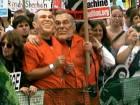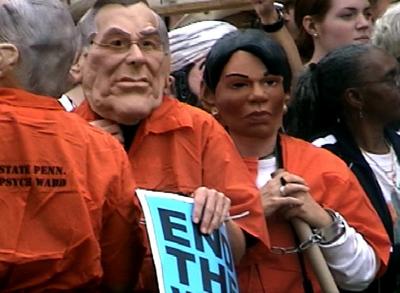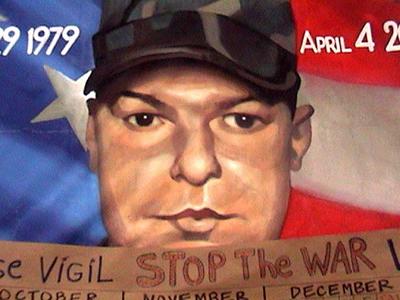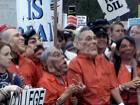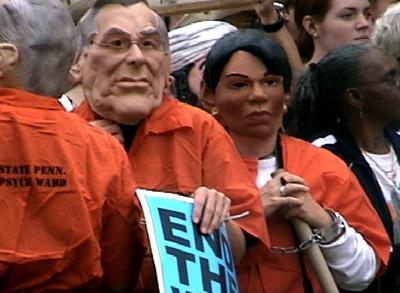

September 7, 2005
Trap is closing on Syria
The scenario scripted with the UN Security Council demand issued in September 2004 for Syrian withdrawal from Lebanon and launched with the February 2005 killing of former Lebanese prime minister Rafiq Hariri is running to the letter, and the noose is tightening around Syria. The question is only peripheral whether Israel alone spurn the rope or whether the US was party to the plot to evict Syria from Lebanon and set it up for regime change, one of the key goals of US President George W Bush's second term. It is not as much of Lebanon that is in play in the scenario. It has more to do with removing Syria as a hurdle in the way of Israeli designs in the region, and the unfolding events, although different in specifics, are very similar to the way Iraq's Saddam Hussein was rail-roaded into the US-led invasion of his country and his ouster. Hariri simply happened to be picked as the sacrificial goat.
On the surface, everything fits in into the jigsaw puzzle, and few could challenge at this juncture the allegation that Syria was behind the Hariri assassination in light of the motivation, circumstances and evidence cited so far. However, these are too pat and convincing that they appear to be orchestrated in a manner similar to the way that the US dealt with Iraq with a bulldozing approach that brushed aside anything and everything that did not fit into its designs and resorted to gross deception in order to justify the invasion of that country in March 2003.
In the case of Syria, the concept is not much different. If Saddam Hussein's weapons of mass destruction were the justification for the war against Iraq, it is Syria's alleged role in the Hariri assassination that is providing the pretext for action against Damascus.
The scenario goes: Hariri, once Syria's ally, was turning against Damascus's domination of his country and he revolted and quit office when the Syrian leadership intervened to forcibly extend the term of President Emile Lahoud against the wishes of a majority of Lebanese politicians in late last year.
From that point, Hariri was marked for "elimination." Add to that, carefully placed "leaks" from Israel that it was in secret contacts with Hariri through Washington and that the Lebanese billionaire politician was inclined towards cutting Lebanon away from Syria and enter a separate peace agreement with the Jewish state.
For all technical purposes, it provided all the more reason for Syria to remove Hariri from the scene, especially that he had resigned as prime minister after the row over Lahoud and appeared to be headed for a landslide victory in elections this year.
So, the motive was established. Then came the task of creating the circumstances. It was relatively easy since many people in senior positions in Lebanese security and intelligence agencies were pro-Syrian and all one needed was to pick some them and build a case against them by planting evidence.
It could not be ruled out that some of them might have worked for Israel without them even being aware of it. Or they were bought or persuaded under some pretext. Anyway, it is a safe bet that some of the top people who were handling Hariri's security and Lebanese security and intelligence officers were picked and set up as the culprits even before the assassination was carried out.
On Feb.14, the curtains went up. The multi-vehicle security convoy carrying Hariri exploded in Beirut, killing the former prime minister and 20 others.
It was not even clear whether it was a suicide bombing or someone had set off up to 600 kilogrammes of remote-controlled explosives. First reports that Hariri was killed by a car bomb were challenged by evidence that the explosives could have been buried beneath the seafront avenue where the blasts took place.. A unique photograph handed to The Independent newspaper of London, which was purportedly taken about 36 hours before the bombing. It shows a drain cover in the road at the exact spot where the explosives went off.
One thing was clear: The operation went like a precision surgery and had all the hallmarks of a professional group supported by the resources and intelligence information that would be available only to a government. The description fit on Syria like a glove (if only because it was designed and tailor-made to fit Syria).
Then, it appeared that the chief of Hariri's security was not travelling in the convoy, and that he also removed key evidence — wreckage of the vehicles — from the scene, or at least that what we have been told. Simultaneously, unsourced reports suggested that the man was a Syrian spy and was passing on information about Hariri's movements to Syrian intelligence and that Hariri had known about it and used to keep him away from key events.
Demonstrations erupted immediately after Hariri's death calling for Syrian departure from Lebanon, the resignation of the pro-Syrian government, including the president himself, and an international investigation into the Hariri killing.
Parallel to that the US and France — the former colonial power which ruled Lebanon and Syria — stepped up international pressure, and eventually Syria had no choice but to withdraw from Lebanon in April in line with UN Security Council Resolution 1569 of September 2004.
Then came stories of how Syrian security and intelligence agents had the run of Lebanon and how brutally they used to treat the Lebanese people and how Damascus dominated every facet of life in Lebanon; and, of course, how the Syrian regime was gaining billions of dollars through its occupation of Lebanon and domination of the business scene plus remittances of hundreds of thousands of Syrian expatriate workers.
All of these came to an end when the last Syrian soldier left Lebanon, ending 29 years of Syrian military presence launched under an Arab League mandate at the height of a civil war in Lebanon.
Under nudging from Washington and Paris, the UN launched an investigation into the Hariri assassination, but the predetermination that Syria was behind the killing was and remains the backdrop to the inquiry.
It reached a decisive point last month when the Lebanese prosecutor filed a formal case charging four pro-Syrian Lebanese officers, former chief of public security Jamil Al Sayyed, the former head of internal security Ali Al Hajj, former chief of military intelligence Raymond Azar and commander of the presidential guard Mustafa Hamdan, with complicity in the Feb.14 bombing.
Parallel to the UN investigations, charges were regularly levelled that Syria was not co-operating with the investigators, led by German prosecutor Detlev Mehlis.
Damascus, which has rejected allegations that it had engineered the killing and said it was always ready to co-operate with the investigations, has now invited Mehlis to Syria to possibly question Syrian military officers who served in Lebanon and perhaps others too.
Mehlis' UN mandate runs out on Sept.15 but this is expected to be extended.
That is where the story rests at this juncture in time.
For most observers of the Middle Eastern scene, it never made sense that Syria was behind the Hariri assassination because Damascus could not have but been aware that it stood to lose everything by Hariri's death.
And in fact, it did lose much. As already noted, it had to withdraw its military from Lebanon under humiliating circumstances; several hundred thousand Syrians lost their jobs in Lebanon and the Syrian government was deprived of several billion dollars in annual earnings through Lebanon; and Damascus was internationally condemned and the American allegation that it supports international terrorism was strengthened. Damascus also lost Lebanon as leverage in potential dealings with Israel.
And a staunchly anti-Syrian government has taken office in Beirut after a coalition led by Hariri's family swept elections held in May.
Surely, Syria would have known the repercussions and consequences of assassinating Hariri, particularly at a time when the US was intensifying pressure on Damascus citing the alleged Syrian role in the Iraqi insurgency and its support for Palestinian "terrorism" (read legitimate resistance against occupation).
Most definitely, Syria is the biggest loser in the bargain, and, apart from the people of Lebanon who are now free to exercise their right to self-determination, the only other beneficiaries from the Hariri assassination are Israel and the US.
Therefore, the conclusion of many is that Israel, which has the strongest and sophisticated intelligence network and advanced spying, surveillance and communication equipment, carried out the killing and created and planted evidence that pointed the accusing finger at Syria.
Under this scenario, many believe that Washington had at least known about the plot and endorsed it but might not have played a direct role in it.
While the Israeli motivation was clear — it wanted to separate Lebanon and Syria so that it could work on the former for a separate peace agreement with no Syrian say in it, the US had a military objective, according to Wayne Madsen is a Washington-based journalist and columnist and the co-author of "America's Nightmare: The Presidency of George Bush II."
Madsen wrote in March that the US wanted to build a military base in northern Lebanon but it would not have been possible while Syria called the shots in Beirut and Hariri himself was opposed to the idea.
Israel and the US were also upset that Hariri was joining hands with the Lebanese Hizbollah movement ahead of the elections that were held in June this year. Hariri had held a series of meetings with Hizbollah meetings since late last year and had appeared to be closing an election deal with the group, an avowed enemy of Israel. So the former prime minister was picked as the sacrifical goat.
Shortly after Hariri's death, it was reported that even without a formal agreement with Lebanon, the contract for the proposed northern Lebanese air base had been granted by the Pentagon to Jacobs Engineering Group of Pasadena, California. Other construction support will be provided by Bechtel Corporation.
The air base — said to be the size of massive American Al Udeid air base in Qatar — is reportedly to be used as a transit and logistics hub for US forces in the region and to monitor movements in the Mediterranean.
There is indeed the chance that someone in the Syria regime, for reasons best known to himself (and definitely not in the service of Syrian interests), had played a role in the Hariri assassination. But, as many veterans in the region observe, in the murky cloak-and-dagger business of intelligence work one could never say who bought whom and when and what elements were at play.
However, that changes little on the ground. The original script-writers are steering the events in Lebanon by the nose towards destabilising Syria and add further to the already fearsome uncertainties in the region.
